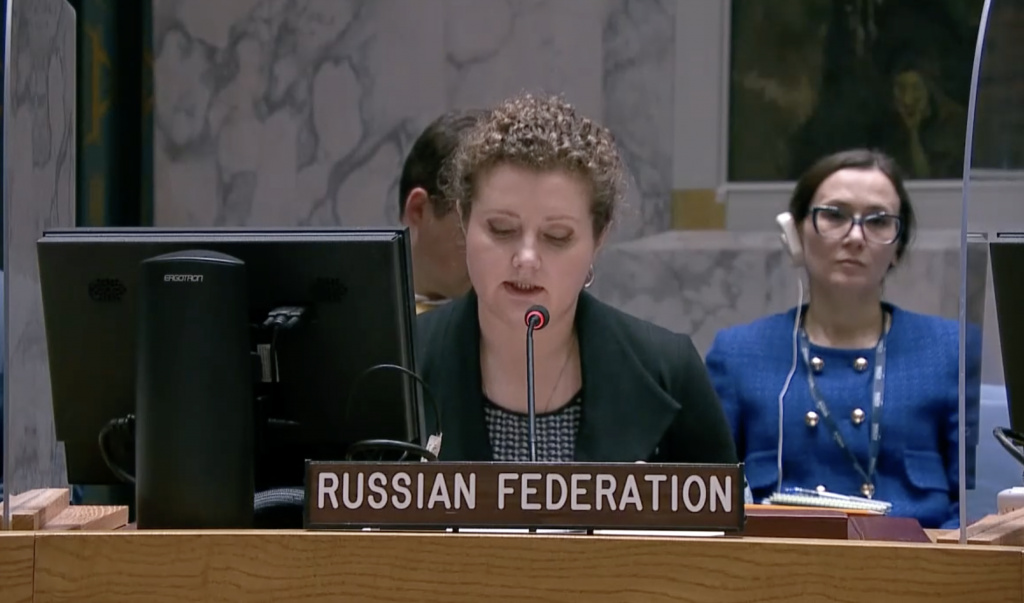Statement by Deputy Permanent Representative Anna Evstigneeva at UNSC briefing on the situation in the DPRK
Mme.President,
We thank USG DiCarlo for the briefing.
Russia stands against any military activity posing threat to security of the Korean peninsula and North-East Asia states. We regret the recent developments in the region.
We are convinced that the search for mutually acceptable diplomatic solutions is the only possible way towards peaceful resolution of the Korean problem and building reliable security mechanisms for North-East Asia. This should be our main goal, which once achieved will ensure normalization in the region.
We regret that over the past 4 years Security Council has not been able to react to the DPRK dismantling its nuclear test site, as well as compliance with the moratorium on nuclear and intercontinental ballistic tests. In every resolution on DPRK since 2006, the Council expressed readiness to readdress the restrictions depending on the level of Pyohgyang’s compliance with respective provisions. Unfortunately, up until now the UNSC has only stiffened the restrictions, ignoring the positive signals coming from North Korea. So to a large extent, the current developments that we see are but consequences of shortsightedness of some colleagues present here, who are not ready to go beyond the limits of sanctions-based paradigm, which has not guaranteed security in the region over those many years. We have seen no other viable initiatives on their end.
We assume that further build-up of sanctions against the DPRK would overstep the framework of measures that curb financing of banned nuclear and missile programs and expose the people of North Korea to risks of inadmissible socio-economic and humanitarian turbulence.
We would like to remind our American colleagues that negotiations are a two-way avenue. There is no point waiting for Pyohgyang to disarm unconditionally when what it gets in return is threats to spiral up sanctions and unsubstantiated promises as guarantees. Establishment of new military alliances in the region, such as the US, UK, and Australia (so called AUKUS) makes benevolent intentions of these states be seriously doubted, i.a. by Pyohgyang, and does not help the dialogue. We repeatedly stressed that it is essential to create spaces of integrated indivisible security. Lasting results cannot be achieved unless legitimate security concerns of all states of the region are taken into account.
Institutes and mechanisms of the United Nations and its Security Council should support inter-Korean settlement and dialogue rather than impede these processes. Only then will we be able to speak of effective resolution of the region’s accumulated problems, including the nuclear one, on the bases of a dialogue and mutually acceptable agreements. Sanctions and pressure will not be able to achieve this.
What raises even greater resentment is the so-called secondary sanctions against the DPRK and other states that Washington and its allies impose in circumvention of and in addition to the UNSC sanctions. Unilateral restrictions not only infringe on sovereignty and legitimate interests of member states and contradict the rules and norms of global trade, but also undermine the integrity of UNSC-imposed sanctions. Attempts to “consecrate” such restrictions by the authority of the Security Council or its 1718 Committee on the DPRK are unacceptable.
We call on everyone to act in a reserved manner and reiterate practical readiness to resuming dialogue in the tideway of prior agreements and adopted obligations. Russian-Chinese draft of a political and humanitarian UNSC resolution remains on the table. It could encourage the sides to boost negotiation efforts. Thereby we would like to point out that the lack of progress at the political track, which the mentioned draft resolution could be part of, threatens with further build-up of tension in the peninsula, which we have seen in recent months.
Thank you.
